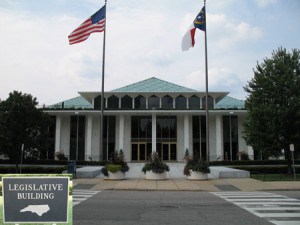In this second installment of “Follow the Money”, I will look at the sponsors and co-sponsors of HB1252 (Protect Cable Monopolies Act). The bill has a host of legislators involved here in North Carolina.
The sponsors are Rep. Ty Harrell (D-Wake Co), Rep. Marilyn Avila (R-Wake Co), Rep. Earl Jones (D-Guilford Co) and Rep. Thom Tillis (R-Mecklenburg Co).
First the good news: Not as much money was thrown around in the House as was in the Senate. Rep. Earl Jones took no money from individuals or PAC’s related to the cable/telecom industry. Rep. Marilyn Avila took $500 from Embarq and $500 from AT&T, along with $100 from an engineer for Verizon.
Rep. Thom Tillis took a total of $3500 from PAC’s ($500 from Embarq, $1000 from Time Warner, $1000 from AT&T PAC and $1000 from AT&T Mobility PAC).
Rep. Ty Harrell took a total of $2750 from PAC’s ($500 from Embarq, $750 from Time Warner, $1000 from AT&T, and $500 from Electricities PAC). He also took $4600 from industry related individuals ($250 from James K Sexton – President of Telephone Strategies Group, $250 from Anthony Copeland – former lobbyist for BTI Telecommunications and FiberSouth, $4000 from Jim Goodman – CEO of Capital Broadcasting, which owns the Raleigh area’s biggest TV and radio stations, and $100 from Lynn R Holmes, who three months after making the donation became one of the current lobbyists for the NC Cable Telecommunications Association).
For the Primary Sponsors a grand total of $7250 from PAC’s and $5600 was given from individuals related to the cable/telecom industry.
The co-sponsors and amounts are as follows:
- Rep. Larry Bell – $500 from Embarq
- Rep. Nelson Cole – $4250 from PAC’s ($2500 from Embarq, $750 from Time Warner and $1000 from AT&T NC PAC). Cole also received $100 from Charles W Pickelsimer – VP/General Manager of Citizens Telephone Co.
- Rep. James W. Crawford Jr. – $3000 from PAC’s ($2000 from Embarq and $1000 from Time Warner). He also took $200 from James Pratt Wilson, a retired telecommunications worker and $50 from Richard Reese, an executive from Lexcom Communications.
- Rep. William A. Current Sr – $1500 from PAC’s ($750 from AT&T and $750 from AT&T NC PAC) – Oddly he was given $250 from Embarq and then returned it the same quarter he received it.
- Rep. Nelson Dollar – $3250 from PAC’s ($1000 from Embarq, $750 from Time Warner and $1500 from AT&T)
- Rep. Beverly M. Earle – $1750 from PAC’s ($250 from Embarq and $1500 from AT&T)
- Rep. W. David Guice – took no PAC money from the cable/telecom industry. He did receive $300 from Charles Pickelsimer III- VP Citizens Phone, $1000 from CW Pickelsimer Jr- VP Citizens Phone and $1000 from Senator Tom Apadaca who took a lot of money ($12500) from the industry.
- Rep. Jim Gulley – $500 from PAC’s ($250 from Embarq and $250 from Time Warner)
- Rep. Mark Hilton – $500 from Embarq. He took nothing else.
- Rep. Hugh Holliman – $11500 from PAC’s ($1500 from Embarq, $2000 from Time Warner, $4000 from AT&T, $500 from NC Cable PAC, $2000 from ElectriCities and $1500 from the NC Assn. of Broadcasters). He also took $550 from Richard Reese who is an executive for Lexcom Communications. You should know that the amounts are generally bigger for Holliman because he is the House Majority Leader.
- Rep. Linda P. Johnson – $750 from PAC’s ($250 from Embarq and $500 from AT&T).
- Rep. Carolyn K. Justus – $500 from Embarq.
- Rep. Marvin W. Lucas – $1000 from PAC’s ($500 from Embarq and $500 from AT&T)
- Rep. Wil Neumann – $1000 from PAC’s ($500 from Embarq and $500 from AT&T)
- Rep. Efton M. Sager – $250 from Embarq
- Rep. Fred F. Steen – $3000 from PAC’s ($1000 from Embarq, $1000 from AT&T and $1000 from ElectriCities)
There is one more House Representative I wanted to bring to your attention, Rep. Harold Brubaker. Brubaker is a former Speaker of the House. He is also on both the House Public Utilities Committee and the Joint Committee for Revenue Law. Brubaker took a grand total of $16250 from industry related PAC’s ($5500 from Embarq, $2750 from Time Warner, $6000 from AT&T, $1000 from Sprint/Nextel and $1000 from the Verizon Good Government Club). He also took $300 from CW Pickelsimer – VP Citizens Telephone.
The way I see it, following the money trail, Rep. Harrell introduced HB1252 for Time Warner’s attorneys and lobbyists. Rep. Holliman can use his powerful position to help secure votes and Rep. Brubaker sits on the committee that decides the bills fate. The cable/telecom industry seems to be getting what it has paid for. They spent a grand total of $463,699 for campaign contributions to legislators in the North Carolina General Assembly in 2008. That’s nearly a half-million dollars! I assure you that if we contributed a half a million dollars collectively as a consumer rights PAC, we would have quite a bit more influence in the legislative process. We have the ability to derail this money train from buying its legislation. We have shown this before. We must remain vigilant in our approach to beating back a greedy industry and keeping our legislators honest (or tossing them to the curb come election).


 Subscribe
Subscribe



